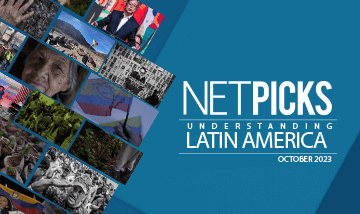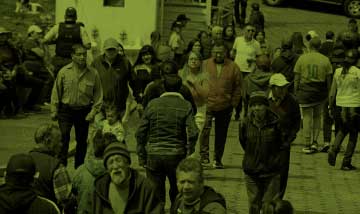Understanding Latin America
Dear readers and colleagues, this month we bring you six articles that reflect the reality of Latin America: one each from Chile, Bolivia, Paraguay, Mexico and Barbados.
-
- Chile far-right candidate rides anti-migrant wave in presidential poll
- Notes from the xi indigenous march in Bolivia
- The Colorado party strengthens its power in Paraguay
- Zapatistas embark on journey for life
- Barbados: the small but mighty force for climate action
.
CHILE FAR-RIGHT CANDIDATE RIDES ANTI-MIGRANT WAVE IN PRESIDENTIAL POLL
Hopes for a more progressive Chile have dimmed with the rise in the opinion polls of far-right, pro Pinochet, presidential candidate José Antonio Kast in the country’s November 21st elections. The coming elections are particularly significant as they will be the first since the eruption of the major social protests in 2019 that led to a broadly left majority in the Constituent Convention charged with writing the country’s new constitution. However, fears over migration, public security and shifting social values, have led to a resurgence of the far right, particularly evident in violent protests erupted in September in the north of the country against Venezuelan immigrants. The stage is now set for a clash between Kast and left wing, former student leader Gabriel Boric, but also in play are two very different visions of the country’s future. The race is tight and Kast may not win, but his traditional value, Trumpian style seems to have resonated with the voting public. According to Gilberto Aranda, an academic at the University of Chile, “fundamentally, Kast defends free markets and traditional values, and favors the image of a monocultural Chile of European descent.”
John Bartlett, October 21st, 2021.
https://www.theguardian.com/world/2021/oct/21/chile-jose-antonio-kast-presidential-election-far-right.
NOTES FROM THE XI INDIGENOUS MARCH IN BOLIVIA
The XI Indigenous March for the Defense of the Territory, Identity and Culture of the Indigenous Peoples of the Lowlands is the largest gathering of Bolivia’s diverse lowland Indigenous peoples and nations since the 2011 “TIPNIS” Indigenous March. The march represented a response to the renewed push that has to colonize Indigenous territory with settlers, agri-business, mining and hydrocarbon resource extraction projects that has been underway since the election of Luis Arce’s Movement towards Socialism (MAS) government in 2020. The March started in the town of Trinidad on the 25th of August, arriving on September 30th with around 700 people at the city of Santa Cruz, Bolivia’s nominally largest city; the principal objective being to rearticulate the Indigenous movement after a decade of division and cooptation by the MAS. Sixteen demands were presented, together with a proposal for an Indigenous Parliament due to the failure of the “Plurinational State” more than 10 years after the approval of the Plurinational Constitution in 2009. Says the author “the march sees no serious effort on the part of Luis Arce’s government to engage in dialogue with the Indigenous Parliament and instead has solicited the international community (UN, EU, IACHR, IWGIA) to recognize their demands.”..Devin Beaulieu, October 13th, 2021.
https://awasqa.org/en/2021/10/13/notes-from-the-xi-indigenous-march-in-bolivia/.
THE COLORADO PARTY STRENGTHENS ITS POWER IN PARAGUAY
Paraguay’s 2021 municipal elections, originally scheduled for November 2020, were held in the context of a poor government response to a Covid-19 pandemic that has taken 16,200 lives; which, together with complaints of corruption had provoked social protests. A novelty of these elections was the introduction of ranked-choice voting, each voter choosing both a party list and a preferred candidate within the list. The result was the participation of 28 parties, 113 movements, 4 coalitions, and 118 electoral alliances, all of which weakened the opposition to the Colorado party that has ruled the country for most of the last thirty years. Despite its major internal divisions, Colorado finally took part in the elections as part of the Concordia Colorada movement, winning the mayoralty races in 160 of the country’s 261 districts, up from 147 in the last elections. The party even managed to win the mayoralty race in the Paraguayan capital of Asunción, despite the fact that its candidate had been accused of billing fraud and a series of irregularities related to municipal spending. The elections were also marked by political violence that began in the June primaries and intensified during these elections. More than a dozen attacks, as well as fatalities among candidates were reported. As far as the next presidential elections are concerned, within the ruling Colorado party an internal struggle has already erupted in the race to be the presidential candidate in 2023. As for the opposition, says the author, “heterogeneous and diverse, its chances will depend on alliances and finding a figure that can arouse the interest of voters and capitalize on citizens’ frustrations—visible on social networks and in protests—which has yet to translate into votes.”..Sara Mabel Villalba, October 25th, 2021.
https://nacla.org/colorado-party-strengthens-its-power-paraguay
ZAPATISTAS EMBARK ON JOURNEY FOR LIFE
In October 2020, a group of Zapatistas from Chiapas Mexico announced their intention to visit the five continents of the world the main objective of the proposed journey being to meet with those individuals, collectives and organizations that share their desire ‘to build a better world, a new world.’ Embarking on the called La Montaña (The Mountain) they set out to cross the Atlantic Ocean. On June 22, following seven weeks sea, La Montaña arrived on the coast of Galicia, where its crew set out on a tour across the continent. Several weeks later, a further delegation made up of 177 Zapatistas, including men, women and children, travelled from Chiapas to Mexico City. This large delegation was named La Extemporánea, in a sarcastic nod to the racist responses the Zapatista delegates faced when applying to get passports from the Mexican Ministry of International Relations. The Ministry had consistently refused the Zapatistas’ documents to prove their Mexican nationality, calling them extemporáneos (extemporaneous, or lacking preparation). Since September 22, both delegations have travelled across Europe, meeting with those who want to engage in a dialogue and exchange experiences of autonomy and resistance. Their visit to Scotland coincides with the gathering of hundreds of climate activists in Glasgow, as part of a global movement to demand climate justice in the frame of the COP26..Mariana Reyes, October 28th, 2021.
https://lab.org.uk/zapatistas-embark-on-journey-for-life/
BARBADOS: THE SMALL BUT MIGHTY FORCE FOR CLIMATE ACTION
Mia Mottley, the first female prime minister of Barbados, is firm in her refusal to allow to her island country to become “collateral damage to the greed of others” as a result of climate change and rising sea levels; Barbados has contributed less than 1% of greenhouse gas emissions, she has noted. The small Caribbean island Mottley represents, whose population is just under 288,000, is now experiencing a host of intersecting crises. COVID-19 has decimated the tourism sector, which accounts for 40% of GDP; unemployment recently reached over 40%; and the public debt is almost $8bn (175% of the country’s GDP). Meanwhile, the increased frequency and severity of hurricanes, tropical storms and droughts due to climate change has been threatening the viability of the island’s tourism and agricultural sectors. By 2030, Barbados wants to be the first 100% green and fossil-free island state in the world, but it will clearly need help to do so. Whether that help will arrive, or whether the world’s nations will take the necessary steps to reduce global warming and the rising sea levels that threaten to swamp the island, is another question. At this year’s 76th UN General Assembly in New York, Mottley had this to say: “In the words of Robert Nesta [Bob] Marley – ‘who will get up and stand up?’ Who will get up and stand up for the rights of our people? Who will stand up in the name of all those who have died in this awful pandemic, the millions? Who will stand up on behalf of all those who have died because of the climate crisis? Or who will stand up for the small island developing states who need 1.5°C to survive as we go to COP26? Who, who will stand up? Not with a little token, but with real progress.”.Aaron White, October 29th, 2021.
https://www.opendemocracy.net/en/oureconomy/barbados-the-small-but-mighty-force-for-climate-action/





